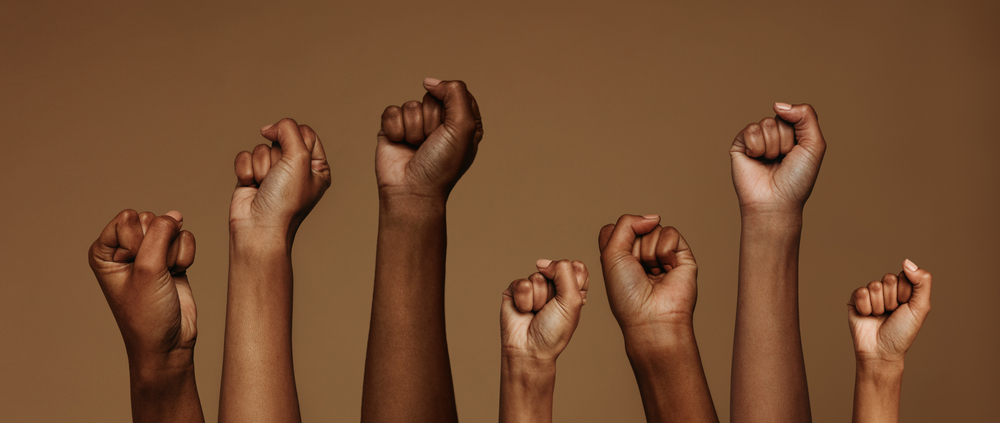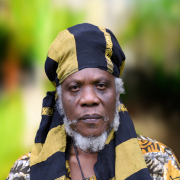The Emergence of Black Power: Exploring Historical Context and Potential Impacts on African American Progress
By Brian Figeroux, Esq. | Editorial credit: Jacob Lund / shutterstock.com
The Emergence of Black Power: A Historical Context. Had African Americans fully embraced the principles of Black Power, they could have potentially been better off than they were under the integrationist approach alone. Read more at www.askthelawyer.us. To read the complete analysis in our publication, click here, and on our civil rights blog, click here.
The Civil Rights Movement and Its Limits
The early Civil Rights Movement, epitomized by leaders such as Martin Luther King Jr., was built on the philosophy of nonviolent resistance and integration. Activists fought to dismantle legalized segregation, known as Jim Crow laws, and to secure voting rights and equal access to public services. Iconic events like the Montgomery Bus Boycott (1955-1956), the Freedom Rides (1961), and the March on Washington (1963) demonstrated the power of collective action, leading to significant legislative victories, including the Civil Rights Act and Voting Rights Act.
However, despite these achievements, the economic and social condition of many African Americans remained dire. The post-civil rights period saw the persistence of racial inequality, police brutality, high unemployment, and poor educational opportunities in black communities. Economic disparities continued, and African Americans still faced systemic racism in housing, employment, and law enforcement. While legal segregation had been overturned, many black Americans felt that integration alone did not bring the meaningful changes they had hoped for.
Stokely Carmichael emerged as a prominent voice within the Civil Rights Movement who critiqued the limitations of the integrationist strategy. After years of organizing in the South with the Student Nonviolent Coordinating Committee (SNCC), where he had been a strong advocate of nonviolent action and civil disobedience, Carmichael began to question whether the integrationist approach truly addressed the root causes of African American oppression. His experience working in impoverished black communities and witnessing the persistent violence and injustice directed at African Americans led him to conclude that real empowerment could only come from black self-determination and control over their own lives.
Defining Black Power
Black Power became the rallying cry of a new generation of activists who were frustrated with the slow pace of change and the continuing economic and political disenfranchisement of African Americans. The term Black Power was popularized by Stokely Carmichael during a 1966 rally in Greenwood, Mississippi, following the shooting of civil rights activist James Meredith. Carmichael, who had recently become the chairman of SNCC, declared, “What we need now is Black Power!” This phrase resonated deeply with many African Americans, particularly young people, who felt that the Civil Rights Movement had failed to address the fundamental issues of power and control over their own communities.
At its core, Black Power rejected the idea that the ultimate goal of African American activism should be integration into white society. Instead, it called for African Americans to embrace their own cultural identity, create independent institutions, and build their own economic and political power structures. Rather than seeking acceptance from the dominant white society, Black Power urged African Americans to develop pride in their blackness and to assert control over their communities and destinies.
Carmichael’s articulation of Black Power encompassed several key components:
- Cultural Identity and Black Pride: Black Power emphasized the importance of cultural pride and the reclamation of African heritage. It encouraged African Americans to reject the cultural standards imposed by white society and instead celebrate their African roots, history, and contributions.
- Self-Determination and Community Control: Carmichael believed that African Americans should control the political, economic, and educational institutions in their own communities. This included creating black-led schools, businesses, and political organizations that served the needs of African Americans, rather than relying on white-controlled institutions.
- Economic Independence: Black Power called for economic independence through the development of black-owned businesses and cooperative economic structures. Carmichael argued that true liberation could only be achieved if African Americans controlled the wealth and resources within their communities.
- Militancy and Self-Defense: While Carmichael initially supported nonviolent protest, he eventually came to believe that nonviolence was not sufficient in the face of white supremacy and state violence. Black Power included the right to self-defense and the use of militant tactics when necessary to protect black communities from oppression.
Black Power and Its Critique of Integration
The fundamental critique that Black Power posed to the mainstream Civil Rights Movement was its rejection of integration as the primary goal of African American liberation. The integrationist approach, which sought to dismantle segregation and ensure equal access to institutions dominated by white society, was seen by Black Power advocates as insufficient for achieving real freedom.
Carmichael and other Black Power leaders argued that integration often placed African Americans in a position of dependence on white institutions and did not address the underlying power dynamics that maintained racial inequality. While integration could provide African Americans with access to education, jobs, and public services, it did not change the fact that these institutions were still controlled by white elites. African Americans remained economically and politically marginalized, even as they were granted greater access to the institutions of white society.
Moreover, integration, in the eyes of Black Power advocates, often required African Americans to assimilate to white cultural norms and abandon their own cultural identity. The desire to be accepted by white society was seen as a form of submission to the very structures of power that had historically oppressed African Americans. Carmichael believed that true liberation could only come through a rejection of assimilation and a celebration of black identity and culture.
By contrast, Black Power called for self-reliance and community control. Instead of seeking inclusion within white-dominated institutions, African Americans should build their own institutions that reflected their values, culture, and needs. This approach aimed to foster a sense of independence and pride within black communities, rather than reinforcing the notion that success was measured by acceptance into white society.
The Core Tenets of Black Power Philosophy
- Embracing Cultural Identity and Black Pride
One of the foundational elements of Black Power, as articulated by Carmichael, was the idea that African Americans should embrace their cultural identity and take pride in their blackness. This concept was in direct opposition to the assimilationist tendencies of the integrationist Civil Rights Movement, which often downplayed the importance of cultural differences in the pursuit of equal treatment under the law.
Carmichael believed that African Americans had been taught to devalue their African heritage and conform to the cultural standards of white society. This process of cultural alienation had profound psychological effects, leading many African Americans to internalize feelings of inferiority and to measure their worth by how well they could assimilate into white culture.
Black Power sought to reverse this trend by promoting black pride and a positive affirmation of African heritage. Carmichael encouraged African Americans to reconnect with their African roots, to learn about their history and culture, and to reject the Eurocentric standards that had been imposed on them. He argued that cultural pride was a necessary foundation for political and economic empowerment.
The emphasis on cultural pride also extended to aesthetics and representation. Black Power advocates popularized the slogan “Black is Beautiful,” challenging the mainstream beauty standards that idealized European features and denigrated African ones. By promoting natural hair, African-inspired fashion, and the celebration of African art and music, the Black Power movement sought to instill a sense of dignity and self-worth in African Americans.
Carmichael’s emphasis on cultural pride was not merely symbolic; it had tangible political implications. He believed that reclaiming cultural identity was essential for breaking the psychological chains of white supremacy and empowering African Americans to challenge the structures of oppression that had been built on the devaluation of blackness.
- Self-Determination and Control Over Institutions
At the heart of the Black Power philosophy was the idea of self-determination—the belief that African Americans should have the autonomy to govern their own communities and control the institutions that shaped their lives. Carmichael argued that African Americans needed to build their own political, economic, and educational institutions, rather than relying on white-controlled systems that had historically marginalized them.
In practice, this meant advocating for black leadership in political offices, black ownership of businesses, and black control over schools and community organizations. Carmichael believed that African Americans were best equipped to understand and address the needs of their own communities, and that true liberation could only come from within.
This emphasis on community control was a direct response to the systemic exclusion of African Americans from positions of power in the United States. While integration efforts sought to gain access to white-controlled institutions, Black Power sought to build alternative institutions that would serve the interests of black people. Carmichael believed that relying on white institutions would only perpetuate dependency and reinforce the power dynamics that maintained racial inequality.
In the political realm, Black Power called for black political leadership and the creation of independent black political parties. Carmichael and other Black Power advocates were critical of white liberal politicians who claimed to support civil rights but often failed to deliver meaningful change. They argued that African Americans needed to elect their own leaders who were accountable to black communities, rather than relying on white allies to fight their battles.
In education, Black Power emphasized the need for black-controlled schools that would teach African American history, culture, and values. Carmichael believed that the public school system, which was dominated by white administrators and curricula, had perpetuated the marginalization of black students by failing to reflect their experiences and contributions. Black Power advocates pushed for the establishment of independent black schools, which would provide an education that empowered black students to take pride in their heritage and prepare them for leadership roles in their communities.
The call for self-determination also extended to economic institutions. Black Power emphasized the importance of black-owned businesses and cooperative economic ventures that would keep wealth within black communities and provide jobs and services to African Americans. Carmichael argued that economic independence was essential for political and social liberation, and that African Americans needed to build their own economic base in order to achieve true autonomy.
- Economic Independence and Cooperative Economics
One of the central tenets of the Black Power philosophy was the call for economic independence through the development of black-owned businesses and cooperative economic structures. Carmichael believed that economic power was the foundation of political power, and that African Americans could not achieve true liberation without controlling the economic resources in their communities.
The emphasis on economic independence was a response to the economic exploitation and marginalization that African Americans had faced for centuries. While the mainstream Civil Rights Movement focused primarily on dismantling legal segregation and securing equal rights, Black Power sought to address the deeper economic inequalities that kept African Americans trapped in poverty.
Carmichael argued that African Americans needed to build their own businesses and create cooperative economic structures that would allow them to control the wealth generated in their communities. Rather than relying on white-owned businesses and corporations, which often exploited black labor and resources, Black Power called for the development of black-owned enterprises that would serve the needs of black people and provide economic opportunities for African Americans.
The idea of cooperative economics was central to Carmichael’s vision of economic independence. He believed that African Americans needed to work together to pool their resources and create collective economic ventures that would benefit the entire community. This could include everything from cooperative grocery stores and credit unions to black-owned factories and farms. By working together to build collective wealth, African Americans could reduce their dependence on white-controlled institutions and create a sustainable economic base for their communities.
Carmichael’s call for economic independence was not just about individual entrepreneurship; it was about creating an economic system that prioritized the needs and interests of African Americans. He believed that capitalism, as practiced in the United States, was inherently exploitative and that African Americans needed to develop alternative economic models that would promote community well-being and self-sufficiency.
- Militancy and the Right to Self-Defense
While Carmichael initially supported the nonviolent tactics of the early Civil Rights Movement, he eventually became disillusioned with the limitations of nonviolence in the face of persistent violence and oppression. By the mid-1960s, Carmichael began to advocate for the right of African Americans to defend themselves against racist violence, a position that became a central tenet of the Black Power philosophy.
Carmichael believed that African Americans had the right to militant resistance and self-defense, particularly in response to the brutal violence they faced at the hands of white supremacists and law enforcement. He argued that nonviolent resistance, while morally powerful, often left black communities vulnerable to attack and failed to achieve meaningful change in the face of entrenched racism.
Black Power advocates, including Carmichael, called for a more militant stance, one that included the right to defend black communities from violent oppression. This position was exemplified by the Black Panther Party, an organization that embraced the principles of Black Power and advocated for armed self-defense against police brutality. The Panthers’ iconic image of black men and women carrying weapons for self-protection symbolized the shift from nonviolent protest to militant resistance in the struggle for black liberation.
While Carmichael did not advocate for indiscriminate violence, he believed that African Americans had the right to defend themselves and their communities from aggression. He saw this as a necessary response to the systemic violence that African Americans had endured for centuries, from slavery and lynching to police brutality and economic exploitation.
The emphasis on militancy and self-defense was controversial within the broader Civil Rights Movement, as many leaders, including Martin Luther King Jr., continued to advocate for nonviolence as the most effective and morally justifiable strategy. However, for Carmichael and other Black Power advocates, the failure of nonviolence to protect black communities from violence and achieve substantive change made militancy a necessary component of the struggle for liberation.
Could African Americans Have Been Better Off Under Black Power?
The Case for Black Power
Had African Americans fully embraced the philosophy of Black Power as articulated by Stokely Carmichael, they could have potentially achieved greater socio-economic advancement and political empowerment than what was achieved through the integrationist approach alone. The key tenets of Black Power—cultural pride, self-determination, economic independence, and the right to self-defense—offered a more comprehensive and radical solution to the systemic inequalities faced by African Americans.
- Cultural Pride and Psychological Empowerment: By promoting black pride and cultural identity, Black Power sought to reverse the psychological damage caused by centuries of white supremacy and cultural alienation. Embracing African heritage and rejecting Eurocentric standards of success and beauty could have fostered a stronger sense of self-worth and unity within black communities. This psychological empowerment would have been a crucial foundation for political and economic advancement.
- Self-Determination and Community Control: Black Power’s emphasis on self-determination and community control could have allowed African Americans to build their own institutions that served their specific needs and interests. Rather than relying on white-dominated political systems, black communities could have developed independent schools, businesses, and political organizations that reflected their values and aspirations. This would have fostered a greater sense of autonomy and reduced dependence on external forces for their well-being.
- Economic Independence: By focusing on economic independence and the development of black-owned businesses, Black Power could have helped African Americans build a sustainable economic base that would have provided jobs, resources, and opportunities within their own communities. The economic disparities that continue to plague African Americans today might have been mitigated if black communities had developed cooperative economic structures that prioritized collective wealth and self-sufficiency.
- Militancy and Self-Defense: The Black Power philosophy’s emphasis on militancy and the right to self-defense could have provided a more effective means of protecting black communities from violence and intimidation. While nonviolent resistance achieved significant legislative victories, it often left black communities vulnerable to ongoing violence from both white supremacists and law enforcement. The right to self-defense would have empowered African Americans to resist violent oppression and assert their right to safety and security.
The Limitations of Integration
The integrationist approach of the mainstream Civil Rights Movement, while successful in dismantling legal segregation and securing voting rights, ultimately left many African Americans economically and politically disenfranchised. The focus on achieving formal equality through access to white-controlled institutions did not address the deeper structural inequalities that kept African Americans in a subordinate position. Integration, in many cases, meant access to institutions that continued to marginalize and exploit black people, rather than providing them with the tools to achieve true autonomy and empowerment.
While integration allowed African Americans to enter schools, workplaces, and public spaces previously reserved for whites, it did not challenge the underlying power dynamics that maintained racial inequality. Black communities remained economically disadvantaged, politically underrepresented, and subject to systemic violence and discrimination. The promise of integration often fell short of delivering the kind of transformative change that African Americans had hoped for.
The Enduring Relevance of Black Power
The principles of Black Power remain relevant today, as African Americans continue to face systemic racism, economic inequality, and political marginalization. The movement for black empowerment, as envisioned by Carmichael, offers valuable lessons for contemporary struggles for racial justice. The emphasis on self-reliance, cultural pride, and economic independence provides a blueprint for addressing the ongoing challenges faced by black communities.
In recent years, the resurgence of movements like Black Lives Matter has revived many of the ideas central to Black Power, particularly the focus on resisting state violence, building independent institutions, and reclaiming black identity. While the tactics and strategies of the movement may have evolved, the core message of Black Power—that African Americans must control their own destinies and build their own power structures—remains as vital as ever.
Conclusion
In conclusion, the philosophy of Black Power, as articulated by Stokely Carmichael, offered a radical and comprehensive vision for African American liberation that emphasized cultural pride, self-determination, economic independence, and the right to self-defense. By rejecting the notion of integration as the ultimate goal of the Civil Rights Movement, Black Power called for African Americans to take control of their own communities, institutions, and futures.
Had African Americans fully embraced the principles of Black Power, they could have potentially been better off than they were under the integrationist approach alone. While the Civil Rights Movement achieved significant legal victories, the deeper economic and structural inequalities that continue to plague black communities today might have been more effectively addressed through the development of black-owned businesses, cooperative economic structures, and independent political institutions.
The enduring relevance of Black Power lies in its call for self-reliance and community control. In a society that continues to marginalize and exploit black people, the principles of Black Power offer a path toward true empowerment and liberation. By building their own economic and political power, African Americans can create a future in which they are not dependent on external forces for their well-being but are instead the architects of their own destiny.
The philosophy of Black Power remains an essential framework for understanding the ongoing struggle for racial justice and black liberation in the United States and beyond. Its lessons continue to inspire new generations of activists, who recognize that true freedom can only be achieved through the empowerment of black communities and the assertion of their right to self-determination. Therefore, the adoption of Black Power principles would indeed lead to greater empowerment and socio-economic advancement for African Americans.












Leave a Reply
Want to join the discussion?Feel free to contribute!